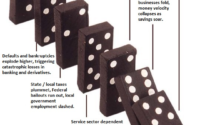Deutsche Bank Still Wobbles as Yellen and Powell Insist System Is Resilient.
It has been a wild few days for banks.
The collapse of Silicon Valley Bank happened this month, but it feels like years ago. It was only on Sunday that the regulator-brokered deal between UBS and Credit Suisse was signed. Since then, stock prices have swung all over the place. We’ve seen interest-rate increases, fears about contagion, and mixed messages about what other help banks might get.
Newsletter Sign-up
The Barron’s Daily
A morning briefing on what you need to know in the day ahead, including exclusive commentary from Barron’s and MarketWatch writers.
It’s certainly too early to say the problems are over. Germany’s Deutsche Bank shares were tanking early Friday as the cost of insuring against its default rose.
The newest information available about the health of U.S. banks came from the Federal Reserve’s discount window. Borrowing is still around levels last seen in the 2008-09 financial crisis. That suggests lenders are loading up on liquidity, just in case another bank run pops up.
Treasury Secretary Janet Yellen seemed to waver. We heard assurances that the system is resilient. Then, that the government hasn’t thought about a blanket extension of deposit insurance. And then, that emergency tools can be used again. Nice, but not the most reassuring performance imaginable.
Fed Chairman Jerome Powell also insisted the banking system is resilient. He raised interest rates, following the European Central Bank’s playbook of saying the tools for financial stability and price stability are independent enough to justify the move. The Bank of England and the Swiss National Bank made similar noises, but no one believes higher rates and banking troubles can be completely disentangled.
It’s tempting to ask why central banks are hiking rates in the midst of such jitters. Yes, inflation is too fast, but it’s coming down and lifting rates now won’t have an impact on consumer prices gains for several months.
The optimistic interpretation is that the banks really are OK. But there remains that nagging doubt that authorities are underestimating how bad things might get.
—Brian Swint
*** Join OPIS Energy Insights on Barron’s Live today at noon. Denton Cinquegrana and Tom Kloza, senior oil analysts at OPIS, a Dow Jones energy data and analysis company, will offer a view from inside the market and forecast the gasoline prices drivers can expect to pay at the pump. Sign up here.
Try your hand at the Barron’s crossword puzzle and sudoku games, now running daily along with a weekly digital jigsaw based on the week’s cover story. To see all puzzles, click here.
***
FDIC Hopes to Name Winning Bids for Silicon Valley Bank
The Federal Deposit Insurance Corp. hopes to arrange the sale of Silicon Valley Bank this weekend, Barron’s Advisorreported. A two-track auction for the sale of the bridge bank and the wealth management arm was wrapping up by today, the report said.
- Silicon Valley Bank collapsed two weeks ago, and the FDIC said Monday there has been substantial interest from multiple potential bidders. Federal regulators said depositors would get back their money, including uninsured deposits, in an effort to calm markets.
- Concerns about the nation’s banking system have remained. On Thursday Treasury Secretary Janet Yellen said regulators would be ready to take further steps to protect the system if needed. That seemed to slightly contradict her comment Wednesday that blanket deposit insurance wasn’t under consideration.
- Banks are taking advantage of relaxed borrowing rules from the Federal Reserve’s programs. Fed data show $110.2 billion in borrowings from the discount window in the week through March 22, down slightly from a record $152.9 billion the prior week. Those loans can be extended 90 days.
- Assets held by money-market mutual funds swelled to a record high $5.4 trillion last week. Money flowing into these funds hit the fastest pace since the start of the Covid-19 pandemic after the collapse of Silicon Valley Bank.
What’s Next: Former FDIC Chairwoman Sheila Bair told MarketWatch the current focus on interest rate risks in the securities portfolios of regional banks is counter productive because it’s a risk faced by banks of all sizes. “All examiners need to be on alert for how interest-rate risk is being managed.”
—Liz Moyer
***
TikTok CEO Resists Lawmakers’ Calls for U.S. Ban
House lawmakers grilled TikTok CEO Shou Zi Chew during a five-hour hearing about the company’s relationship with Beijing-based parent ByteDance and the Chinese Communist Party, hours after The Wall Street Journal reported that officials in China oppose the forced sale of the video-sharing platform.
- House Energy and Commerce Committee chairwoman Cathy McMorris Rodgers (R., Wash.) asked Chew to say with “100% certainty” that the Chinese government couldn’t use TikTok to spy on Americans or manipulate what they see. Chew said TikTok would firewall U.S. user data from “all unwanted foreign access.”
-
Chew repeatedly said TikTok doesn’t spy on Americans on behalf of China, and doesn’t post or remove content at the CCP’s request. TikTok has a contract with
Oracle
for the company to store all its U.S. user data and is routing its U.S. traffic to Oracle and its U.S. Data Security unit. - Lawmakers also asked about content moderation, child safety on the platform, and misinformation. A TikTok spokeswoman said the CEO “came prepared to answer questions from Congress, but, unfortunately, the day was dominated by political grandstanding that failed to acknowledge the real solutions already under way.”
-
A TikTok ban could boost advertising revenue for rival social media platforms such as YouTube, Instagram, and Snap, said Emile El Nems, senior credit officer at Moody’s.
Snap
stock rose 3.1% on Thursday, while Instagram parentMeta Platforms
was up 2.2%, and YouTube parentAlphabet
rose 2.2%.
What’s Next: Actually banning TikTok faces practical and legal hurdles, and federal judges have previously rejected former President Donald Trump’s attempts. A ban could also hurt Democrats because TikTok’s younger users are more likely to vote for them rather than Republicans, the Journal reported.
—Eric J. Savitz and Janet H. Cho
***
Ford Motor Shares Fresh Data on Projected EV Growth
Ford Motor
offered fresh data about its electric vehicles that could help investors answer the key question of how big its traditional car business will be after its transition to EVs. It also presented its business segments in a new way, reporting financials for EVs, traditional cars, and commercial vehicles.
- Ford’s EV-focused Model E business lost about $2.1 billion on sales of $5.3 billion in 2022, and shipped about 96,000 units globally. Management expects the 2023 loss will be about $3 billion. Tesla also lost money when it was about the size of Ford’s EV business.
- Ford’s restated financials and guidance show that its traditional car business is getting better, earning $6.8 billion in 2022 and estimated to earn more than $8 billion this year. The exact amount is tough to pin down and requires making assumptions about earnings at Ford Pro and Ford Credit.
- Deutsche Bank analyst Emmanuel Rosner wrote that Ford’s 2022 and 2023 EV losses are smaller than he expected, noting that management expects Ford’s sales compared with costs for its first-generation EVs is “expected to approach break-even this year.” First-generation EVs include Ford’s F-150 Lightning, Mustang Mach E, and electric Transit van.
- Elsewhere, EV news outlet Electrek reported that Tesla expects its lowest-priced Model 3 sedan will lose eligibility for the federal $7,500 EV tax credit because it uses batteries from China. Tax credit eligibility requires certain U.S.-made components. Tesla and the Internal Revenue Service could not be reached for comment.
What’s Next: Ford is eventually targeting EV unit operating profit margins of 8%, expecting to benefit from scale, lower battery costs, and better designs. An 8% margin implies roughly $5 billion in operating profit by 2026, and its EV business growing about 80% to 90% a year by 2026.
—Al Root and Janet H. Cho
***
FTC Proposes Rule to Make Quitting Subscriptions Easier
The Federal Trade Commission proposed a new “click to cancel” rule that would require companies to simplify canceling subscriptions by allowing consumers to quit gym memberships, digital streaming, cable television, e-commerce, and other services the same way they signed up for them.
- The proposal takes aim at subscription offers that allow consumers to sign up online but require cancellation to be in person, by writing or by calling a number and waiting for a service representative. Such tactics encourage consumers to give up. “Canceling a subscription should be easy,” FTC Chair Lina Khan said.
- The “click-to-cancel” proposal would amend the current “negative option rule,” which companies use to notify customers about a product, send it, and then charge for it unless the customer affirmatively declines. Companies are using “ever more sophisticated dark patterns to thwart consumer efforts” to break away, MarketWatch reported.
- Thursday’s proposal requires companies to ask consumers if they want to hear about additional offers or modifications first when they try to cancel a subscription. A “no” answer would trigger the cancellation process.
-
The FTC has investigated
Amazon
since 2021 for allegedly using deceptive sign-up and cancellation practices with Prime and other subscriptions. The FTC reached separate settlements with Vonage internet phone service in 2022, and with online children’s education company ABCmouse in 2020, over their cancellation practices.
What’s Next: The FTC voted 3 to 1 to introduce the proposal, with Republican Commissioner Christine Wilson opposing because it was too broad. Wilson is stepping down at the end of March. Public comments will open for 60 days after the proposed rule is published in the Federal Register.
—Janet H. Cho
***
Lionel Messi, Cristiano Ronaldo, Rihanna Reach Billionaire Status
The global billionaire population declined 8% year over year in the 12 months to January due to volatile stock markets and a strong U.S. dollar, according to new data. Newly minted billionaires are sports and entertainment stars, including Lionel Messi, Cristiano Ronaldo and Rihanna.
- There were a total of 3,112 individuals worth more than $1 billion, 269 fewer than a year ago, according to the Hurun Global Rich List 2023 released Thursday. The billionaires’ combined wealth also dropped 10% year over year to $13.7 trillion. Wealth is calculated in U.S. dollar terms based on a snapshot on Jan. 16.
- Bernard Arnault of French luxury goods conglomerate LVMH saw his wealth increase 37%, boosting him to the first place on the list with an estimated net worth of $202 billion.
- Tesla’s Elon Musk dropped to second place with a net worth of $157 billion, a 23% decrease from a year ago due to a significant decline in the electric-vehicle maker’s value.
What’s Next: The list tells the story of the global economy through the stories of the world’s richest individuals, said Hurun Report’s Rupert Hoogewerf. He added: “Who’s up and who’s down highlights the trends in the economy.” With the uncertainty over interest rate hikes; a hard, soft, or no landing in terms of possible recession; and the appreciation of the U.S. dollar, the reshuffling of billionaires in the 2024 rankings will be fascinating.
—Fang Block and Rupert Steiner
***

Do you remember this week’s news? Take our quiz below to test your knowledge. Tell us how you did in an email to [email protected].
1. Which bank has agreed to buy Credit Suisse Group for more than $3 billion, in the first systemically important global merger since the 2008 financial crisis?
a. UBS Group
b. BNP Paribas
c. Citigroup
d. JPMorgan Chase
2. What is the name of the video-editing app that has been downloaded more in recent weeks than TikTok, which is also owned by Chinese company ByteDance?
a. VideoCut
b. ClipCut
c. CapCut
d. TikCut
3. Feeling the effects of higher interest rates, home prices, as reported by the National Association of Realtors, fell 22.6% in February on a year-over-year basis for the first time since:
a. 2011
b. 2012
c. 2013
d. 2014
4. The Federal Reserve’s Open Market Committee raised its benchmark interest rate by a quarter of a percentage point this week and signaled there will probably be one more rate increase this year, bringing its target range to an expected:
a. 5% to 5.25%
b. 5.25% to 5.50%
c. 5.50% to 5.75%
d. 5.75% to 6%
5. Which payments company’s shares lost more than 20% Thursday morning after short seller Hindenburg Research questioned the company’s user numbers and accused it of predatory tactics after a two-year investigation?
a. Paysafe
b. Pay Pal
c. Global Payments
d. Block
Answers: 1(a); 2(c); 3(b); 4(a); 5(d)
—Barron’s Staff
***
—Newsletter edited by Liz Moyer, Patrick O’Donnell, Rupert Steiner
[ad_2]
Source link
Related Posts

Gold Ignores Negative News: Bulls Overexuberant?

Of Two Minds – How Many Dominoes Must Topple Before One Falls on Us?
